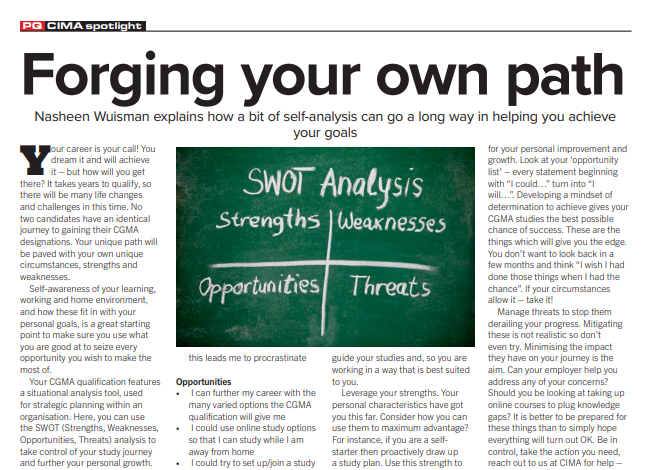June 2024
Nasheen Wuisman explains how a bit of self-analysis can go a long way in helping you achieve your goals.
Your career is your call! You dream it and will achieve it – but how will you get there? It takes years to qualify, so there will be many life changes and challenges in this time. No two candidates have an identical journey to gaining their CGMA designations. Your unique path will be paved with your own unique circumstances, strengths and weaknesses.
Self-awareness of your learning, working and home environment, and how these fit in with your personal goals, is a great starting point to make sure you use what you are good at to seize every opportunity you wish to make the most of.
Your CGMA qualification features a situational analysis tool, used for strategic planning within an organisation. Here, you can use the SWOT (Strengths, Weaknesses, Opportunities, Threats) analysis to take control of your study journey and further your personal growth.
Let’s SWOT analyse
Get a piece of paper and write down the four headings. Under each heading, think carefully about how they relate to you and your circumstances. Here are a few possible examples:
Strengths
- I have a supportive family and/ or study buddies at work
- I rarely have to work overtime
- I get time off work for exams and/or study
- I am interested in the subject material
Weaknesses
- My typing speed in slow
- I struggle with calculations
- I get overwhelmed easily and this leads me to procrastinate
Opportunities
- I can further my career with the many varied options the CGMA qualification will give me
- I could use online study options so that I can study while I am away from home
- I could try to set up/join a study buddy network on Facebook or WhatsApp
- I can access lots of free resources in the CGMA Study Hub
Threats
- I am starting a new project/job and don’t know how study will fit in
- If I take up exemptions from previous study, I may have knowledge gaps
- I’ve never been great at written exams, so I worry about the Case Study
What now?
Firstly, take a moment to absorb the insights from your analysis. Make sure it is complete and honest, so that you can use it successfully to guide your studies and, so you are working in a way that is best suited to you.
Leverage your strengths. Your personal characteristics have got you this far. Consider how you can use them to maximum advantage?
For instance, if you are a self- starter then proactively draw up a study plan. Use this strength to self-motivate, and to keep moving forward. These strengths are going to help you reach your goal.
Focus on your weaknesses and what you have learnt from them.
This will allow you to adapt as you get further into your learning journey. Everyone has areas they struggle with and where they could improve. Gaining awareness of these weaknesses is the first step.
After that, work on them, devote a bit of time to them, allow time for practice and absorption. If you are a slow typer, then use a free online tool which helps you to get that little bit faster – some weaknesses will always remain, but you are in control of trying to turn some of these around, they won’t stop you from achieving your goals.
Seize opportunities that you need for your personal improvement and growth. Look at your ‘opportunity list’ – every statement beginning with “I could…” turn into “I will…”. Developing a mindset of determination to achieve gives your CGMA studies the best possible chance of success. These are the things which will give you the edge.
You don’t want to look back in a few months and think “I wish I had done those things when I had the chance”. If your circumstances allow it – take it!
Manage threats to stop them derailing your progress. Mitigating these is not realistic so don’t even try. Minimising the impact they have on your journey is the aim. Can your employer help you address any of your concerns?
Should you be looking at taking up online courses to plug knowledge gaps? It is better to be prepared for these things than to simply hope everything will turn out OK. Be in control, take the action you need, reach out to us at CIMA for help – that is what we are here for.
Treat your SWOT analysis as a live document rather than a one- off exercise. Be reflective and come back to it once a month and see what weaknesses you have addressed, what steps you have started to take to address the threats and which opportunities you have reached out to. You will find that you have developed some new strengths as well! We grow and develop all the time. Be self-aware, take control of your learning journey, revel in your progress and keep that goal in mind – always!
- Nasheen Wuisman, Senior Manager of Global Academic Progression at AICPA & CIMA, together as the Association of International Certified Professional Accountants




